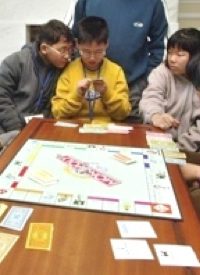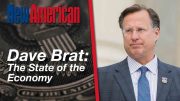
Americans have indicated avid opposition to property rights violations throughout the course of U.S. history, whether those violations take the form of taxation, eminent domain, or “open space” laws. According to one psychologist, that sense of being wronged when one’s property rights are violated may be innate, as property ownership may be a natural-born attribute.
In an article published in Science News magazine, Bruce Bower contends that young children are predisposed to concepts of possession, ownership, and ultimately, capitalism. Citing evidence produced by psychologist Ori Friedman, Bower asserts that children are natural-born capitalists.
Bower writes:
Psychologist Ori Friedman of the University of Waterloo in Canada reported on May 28 at the Association for Psychological Science annual meeting [that] at ages 4 and 5, youngsters value a person’s ownership rights — say, to a crayon — far more strongly than adults do, Friedman and psychology graduate student Karen Neary found.
Rather than being learned from parents, a concept of property rights may automatically grow out of 2- to 3-year-olds’ ideas about bodily rights, such as assuming that another person can’t touch or control one’s body for no reason, Friedman proposed.
According to Friedman, “Parents and adults may teach kids when it’s appropriate to disregard personal ownership,” such as when to lend a toy to another child.
Friedman’s research was based on a study he conducted with 40 preschoolers, ages 4 and 5, and 44 adults. The experiment was conducted in three parts. Science News writes:
Participants saw an image of a cartoon boy holding a crayon who appeared above the word “user” and a cartoon girl who appeared above the word “owner.” After hearing from an experimenter that the girl wanted her crayon back, volunteers were asked to rule on which cartoon child should get the prized object.
About 75 percent of 4- and 5-year-olds decided in favor of the owner, versus about 20 percent of adults.
A second experiment consisted of more than 100 kids, ages 3 to 7, and 30 adults. In this case, participants saw the same cartoon boy and girl but were told that the crayon belonged to the school that the two imaginary children attended.
Nearly everyone, regardless of age, said that the user should keep the crayon for as long as needed in this situation. In other words, kids distinguished between people using an owned or a nonowned object.
In a final experiment that presented two cartoon adults, one using a cell phone that the other owned, most 4-year-olds but only a minority of adults declared that the device should be returned to its owner even before the borrower had a chance to use it. Children showed some flexibility in allowing borrowers to keep the phone — say, if it was needed for an emergency — but adults adjusted their opinions more readily to such circumstances.
Dan Ariely, psychologist at Duke University, asserts that it is difficult to ascertain just how the children came to their conclusions as they did. But Friedman believes that early thinking about possessions is clearly not learned, but innate.
“A concept of ownership rights may be a product of the way we naturally think early in life,” he concluded.
Remarking on the experiment, blogster Eric Falkenstein referenced the philosophies of great thinkers such as Ludwig von Mises, Frederic Bastiat, and F. A. Hayek, all of whom garnered a reputation as champions of private property rights.
In his book The Law, Bastiat observed, “Life, liberty, and property do not exist because men have made laws. On the contrary, it was the fact that life, liberty, and property existed beforehand that caused men to make the laws in the first place.”
It is perhaps for this reason that people tend to feel so violated when their property rights are threatened, to include rights to their own body, which have been violated as a result of TSA screening procedures.
Unfortunately, property rights have been under attack for quite a while. For example, the United Nations has not so shyly revealed a disdain for private property ownership. During a 1980s UN Conference on Human Settlements, UN officials declared:
Land cannot be treated as an ordinary asset, controlled by individuals and subject to the pressures and inefficiencies of the market. Private land ownership is also a principal instrument of accumulation and concentration of wealth and therefore contributes to social injustice; if unchecked, it may become a major obstacle in the planning and implementation of development schemes. The provision of decent dwellings and healthy conditions for the people can only be achieved if land is used in the interest of society as a whole.
Today, the United Nation’s philosophies against private property ownership are manifested in Agenda 21, which proposes a global regime that will serve to monitor nearly every area of land on earth. Agenda 21 has already negatively impacted cities in Texas and California, where residents are now forced to adhere to rules and regulations imposed by the United Nations regarding property rights.
Another example of government-sanctioned property ownership violations took place under President Franklin D. Roosevelt, when gold ownership became criminalized, and Americans were forced to turn their gold over to the federal government.
Delaware residents learned the hard way that property rights are not exactly untouchable when they were fined for possessing basketball hoops that stood within seven feet of a pavement’s edge in a residential subdivision. Not only were these residents subject to fees, but many had their basketball hoops removed by Delaware State Police and the Delaware Department of Transportation.
The list goes on.
While property rights continue to be endangered, it is worth noting that the sense of property ownership may very well be innate. Perhaps advocates of increased taxation and imminent domain should take this into consideration the next time they propose the immoral taking of one’s personal property.
Photo: South Korean students play Monopoly at the Seoul English Village in Seoul, South Korea, Dec. 7, 2004.: AP Images




